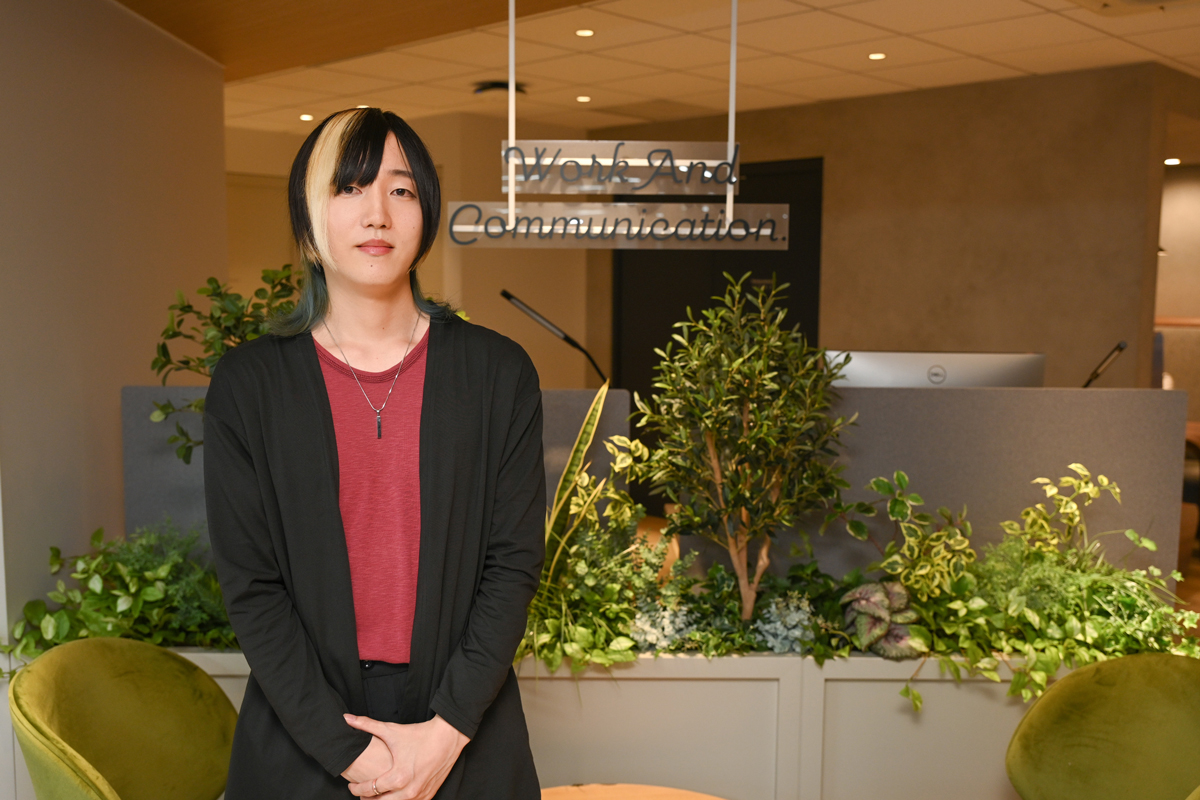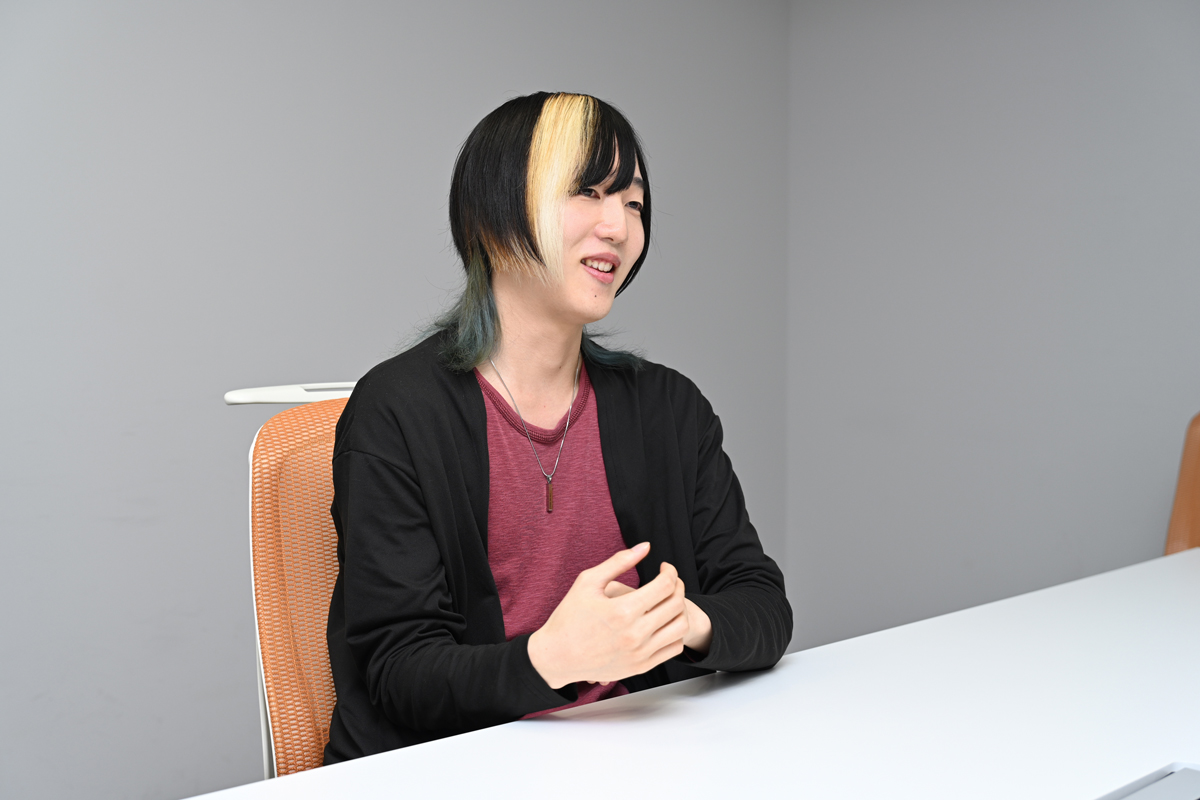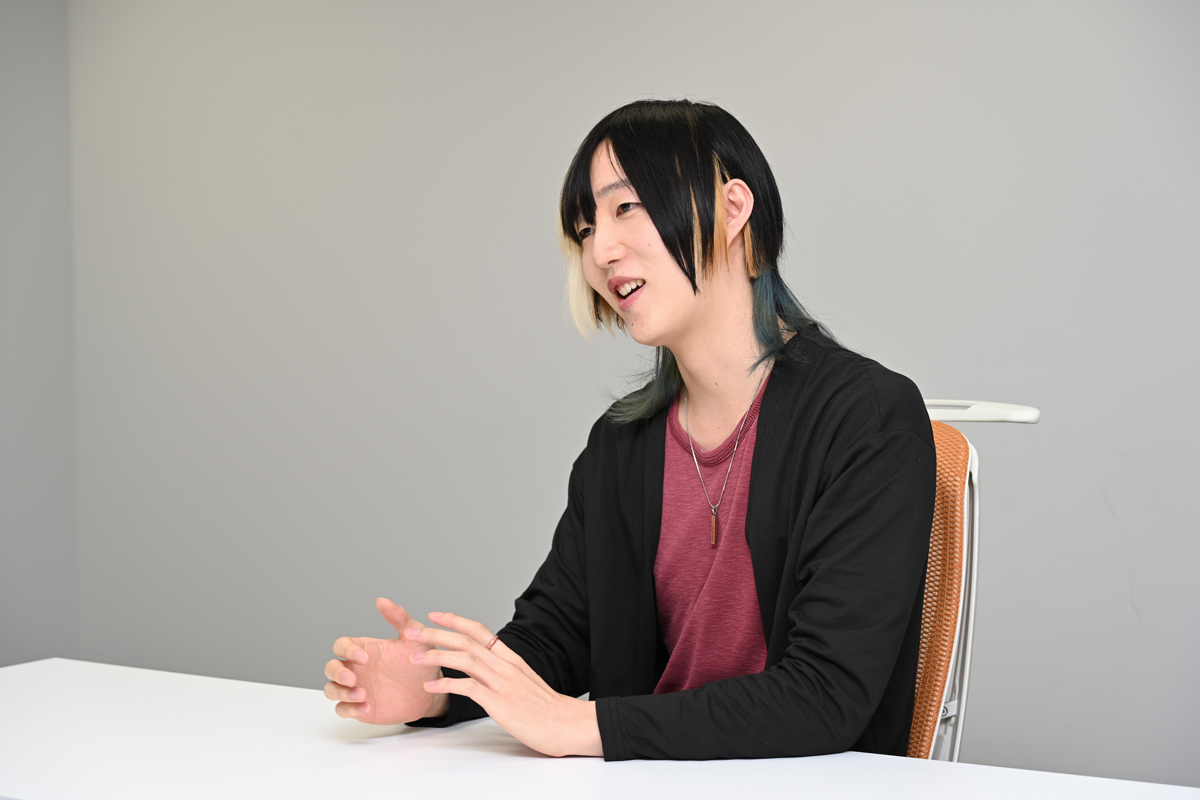*BNS will be used in place of Bandai Namco Studios for the rest of the article for brevity.

Technical Artist Taichi Yanagiya
―Thanks for taking time off your busy day! Can you tell us your current affiliation and what you’re working on now?
I’m on the TEC team. I do anything the game projects I’m assigned to needs.
For example, if someone asks me about something, I’ll give some suggestions as to what steps to take to solve their problems. During that process, maybe we’ll decide to make a tool, or we’ll query people for their ideas and find something that will satisfy everyone, or we’ll decide on usage rules for a particular tool. That’s most of what I do.
―That really does sound like anything. How do people contact you when they have something that needs fixing?
They ask me in-person, send me emails, and even ask via chat.
In addition to inquiries from game projects, people ask me for help on department-wide or company-wide development environments, I get questions about specific software, and I also share information on related news. A lot of this is done via chat tools.
―Why did you decide to become a Technical Artist?
I actually didn’t know about Technical Artists as a profession when I started job hunting.
I looked at the career pages of the companies I was applying to when I started job hunting, and the words “Technical Artist” piqued my interest.
I then read the Technical Artist job description and requirements on the BNS careers site, which made me think I was perfect for the position. I guess that’s the backstory.
The more I looked into the job of a Technical Artist, the more it seemed like it fit what I had already been doing at school, and what I want to do for work. It really seemed like the ideal job.
―What were you taught in school?
I was in the science and engineering department, and the research lab I was in worked on 3D visuals. We had people who worked in the visual media industry, as well as people from the video games industry, and their influence encouraged me to work in the video games industry.
I also liked CG artwork outside of school, so I started learning by myself when I started studying at university. I also liked music so I started doing DTM, drawing, and animating. I branched off to making videos and games by combining the things I had been learning. I spent my university days being a “do-it-all director”.
―How multitalented! Since you can make music and draw as well, do you think there was a possibility of you working in non-Technical Artist positions?
The possibility was certainly there. When I had to choose between post-graduate studies or employment, I also thought about going to a college specialized in CG graphics and entering the industry from there. So CG designer was another potential career path for me.

―Do you have any memorable stories to share since you started working at BNS?
BNS was the third or fourth company interview I had. I was able to talk to various kinds of people since I already had interviews with other companies, but I remember the BNS interviewers trying to create a relaxing atmosphere so as to not intimidate the interviewees. That said, I was nervous at the interview (laughs).
―Do you remember what you talked about with the interviewers?
We talked about my research in university, and the CG graphics and animations I made for fun. An interesting conversation was about working overseas. They asked if I wanted to work in one of the studios outside Japan, and I answered that I didn’t really want to because I would miss eating Japanese food… I hope that relays how casual the interview was.
―What is it like to work as a Technical Artist? Can you describe it in a way that’s useful for people looking to become Technical Artists themselves?
Technical Artists encompass various disciplines, so the phrase by itself might not be very helpful. Some Technical Artists might be good at rigging, some can program or write tools, and some might be good at lighting. So it’s hard to say something like “if you can do this, you’re a Technical Artist!”
That said, the generally accepted definition of a Technical Artist is someone who bridges the artists and the engineers, looking at workflows as a whole and finding ways to optimize them based on logical decisions.
When you’re doing this bridging, you have to communicate with people so you need to choose your words and work to reach an agreement. It’s also not just about solving the issues at hand, we need to optimize with an eye towards the future, and we also make rules to achieve this.
―What kind of skillsets or personalities do you think would show aptitude for a Technical Artist?
I think someone who doubts everything would make a good Technical Artist. When you’re taught something, I think it’s important to ask why instead of just accepting it as fact.
It’s also important to be able to understand other people’s feelings. Always see things from someone else’s perspective and be able to simulate in your mind how someone will feel when you say or do something. I think it’s very valuable to do that and refine yourself based on the result.
Put simply, it’s just about having compassion. Doubt things but have compassion.
―Can you give advice to people who want to become a Technical Artist at BNS?
I’m frequently asked what can be done to get a leg up, and I want to say, “do something you can only do now”. Getting the job isn’t the end; there’s no hard skill condition for getting employed at BNS, so the more experiences you can leverage, the more skills you have when you’re still in school, the better.
For example, you have a lot less free time when you start working, so vacationing outside Japan would be a good experience to have. It’s also a good idea to try out some cutting-edge technology; you don’t have to get proficient at it. Just have things you can leverage when you enter the industry.

―Do you have a personal rule that you keep in mind, or something you’re confident about?
I mentioned this when talking about Technical Artist skills just now, but three things I keep in mind: don’t stop thinking, doubt everything, and have empathy.
Solving the immediate issue is often not a fix for the underlying problem. We need to think about what we need to do to resolve the underlying problem, so I try to always keep thinking.
―What part of the job feels rewarding?
It’s rewarding when the people I work with thank me for my work.
Since everyone comes to me hoping for a solution, it’s rewarding when I have an answer for them, they start trusting me and are appreciative of my help. Recently, my work also feels rewarding when people contact me thinking that even if their problem isn’t solved, I can be trusted to help them make progress in the right direction.
―What kind of people do you find easy to work with?
People who come talk to me are nice.
It’s not possible to stay one step ahead of everything, so a lot of my work ends up being request-based. If people don’t come and talk to me, I don’t know what they want and my team can’t help.
Many of us try to get things done by just putting in more effort, but work is easier for me if people come and talk to me in person or even via chat. Don’t hesitate even if you think the request might be an annoying fix.
―What are your aspirations, or are there any challenges you want to take on in the future?
I think it would be nice if we had more new graduate Technical Artists. I think there are fewer of us compared to developers in other disciplines. I keep in touch with Technical Artists from other companies as well, so it would be nice if it could lead to something like this interview.
We can focus more on game development the more Technical Artists we have in the industry, as it reduces the workload for everyone, at BNS and outside BNS.
―Lastly, please tell us your personal mantra
I think the phrase “shunpu shusou (春風秋霜)” is perfect as it’s similar to how I approach things.
Essentially, it means to be easy on others but harsh on yourself.
―Thank you very much!





